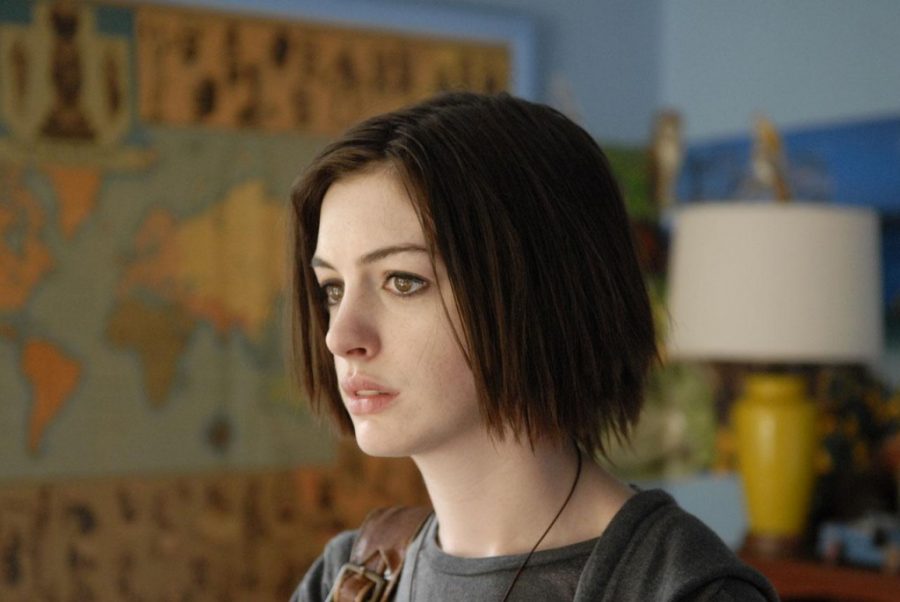Empathy and family: A message spread by Chaz Ebert, exemplified in ‘Rachel Getting Married’
Photo Courtesy of Sony Pictures Classics.
Anne Hathaway as Kym in “Rachel Getting Married.” The film tells the story of a young woman, recently released from rehab, who attends her sister’s wedding. Roger Ebert Fellow Eunice describes the film as being documentary-like, with its raw emotions and the story’s heavy subject matter demonstrating Chaz Ebert’s message of empathy, especially in regards to familial relationships.
April 13, 2019
Editor’s note: Each year, the University of Illinois College of Media Roger Ebert Fellows cover the Ebertfest film festival at Champaign’s Virginia Theatre, continuing through Saturday. Here they report on the first two days of the festival. For more of the 2018-19 Ebert Fellows coverage, go to Illinois Public Media at will.illinois.edu and, early next week, rogerebert.com.
Throughout the first two days of Ebertfest, empathy was the central message Chaz Ebert wished to spread with the film festival co-founded by her late husband, University alumnus and Pulitzer Prize-winning film critic Roger Ebert. Before the screening of “Amazing Grace,” for example, the audience saw a short video of Chaz with her “empathy truck,” talking to Chicago residents about the role of empathy and kindness in today’s world.
Empathy becomes a necessity when it comes to familial relationships. People don’t choose their families. A family’s circumstances must be dealt with and this becomes an often bittersweet task of managing a whirlwind of emotion and madness.
In her introduction Thursday, Chaz described many conversations she had with Roger about the meaning of director Jonathan Demme’s “Rachel Getting Married.” They concluded the movie is about forgiving people for their faults and loving them despite these faults.
The complicated nature of family relationships is a major theme in the 2008 drama. “Rachel Getting Married” follows a young woman, Kym, played by Anne Hathaway, who is released from drug rehab so she can attend her sister Rachel’s wedding, played by Rosemarie DeWitt.
Get The Daily Illini in your inbox!
Demme’s slice-of-life depiction of Kym’s interactions with her family during Rachel’s wedding preparations reveals a tug of war between Kym and her sister. Kym finds herself being thrown into an overwhelming setting while attempting to make amends with herself and her family members about her previous actions.
The movie’s title suggests a romantic comedy and to its credit, the film does find ways to unexpectedly squeeze out laughs, often with a cringing or gut-wrenching layer to them.
But it’s the sensitive and realistic portrayal of Kym’s struggle to stay clean separates this movie from the rest. Screenwriter Jenny Lumet’s plot sometimes gets pushed aside for the sake of depicting the individual relationships within the family. Viewers are only given so much and the film’s observational style includes handheld “shaky cam” cinematography.
That style, the raw emotion captured by the leading performances and the story’s heavy subject matter give “Rachel Getting Married” the feeling of a documentary rather than a fiction feature. Small details such as hearing a baby cry in the background during the wedding scene make the movie feel so real. Scenes seemingly about mundane activities pack a gut-punch of impact.
In one sequence, a dishwasher-organizing competition sprouts out of lighthearted fun between Kym’s father, played by Bill Irwin, and Rachel’s fiance, played by Tunde Adebimpe. The scene takes a sudden, stark, poignant turn that sucked all the air out of the room on screen and out of the Virginia Theatre auditorium.
Earlier Thursday, Jean Epstein’s 1923 French silent film “The Faithful Heart” featured music composed and played live by the Alloy Orchestra. This was a new film-watching experience for me and I found it completely captivating.
The intense melodrama is about Marie, a Marseilles woman in love with one man, Jean, but forced to marry another, the abusive drunk Petit Paul. As with “Rachel Getting Married,” this film’s plot becomes a backdrop to the emotions of its characters. The intense close-ups reveal the deathly glisten of the character’s eyes and the detailed texture of their skin. The cinematography was shockingly detailed, even psychedelic at some points with the use of quick cuts, kaleidoscopic and distorted camera shots.
The film’s ambiguous ending came as a surprise. With the villain out the way, the phrase “Love allows one to forget everything” appears on screen. But the bleak look on Jean’s face as he goes around and around on the carnival ride with Marie throws that happy ending out the window.
This backhanded slap of an epilogue, combined with the musical grace of the Alloy Orchestra, made for a memorable Ebertfest experience.
Eunice is a 2018-19 Roger Ebert Fellow.







